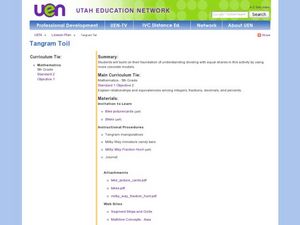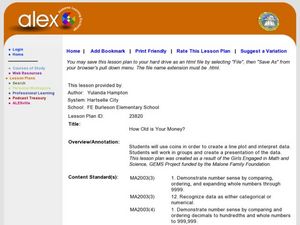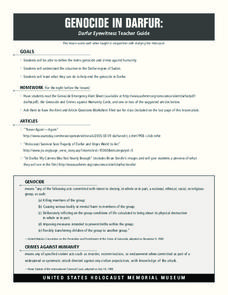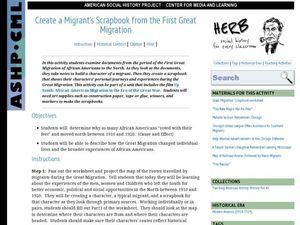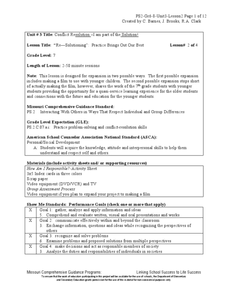Illustrative Mathematics
High Blood Pressure
Does watching TV increase one's blood pressure? Assess student understanding of how study design dictates whether a conclusion of causation is warranted. Use this as a prompt for a small group or whole class discussion, or as a part of a...
Curated OER
The Sum of the Parts
Second graders observe some everyday common objects in order to attempt to learn about simple systems and how they fit together. They observe small details in order to identify the parts of a whole design.
Curated OER
Amazing Transpiration
Learners observe a leaf and discuss the way that water is released from a leaf through its stomata. For this water cycle instructional activity, students calculate how much water leaves produce from a whole tree. ...
Curated OER
Got the Whole World in My Hands
Students review factors that threaten survival of different species. this instructional activity is part of a multi-segmented unit on animal survival.
Curated OER
Tangram Toil
Fifth graders find fractional parts of a whole. In this tangram lesson, 5th graders are given a tangram manipulative and must put the pieces together to form a square. Students determine the fractional value of each of the tangram...
Curated OER
Fantastic Fractions
Fourth graders work with fractions using hands on experiences and reasoning skills and use fractions to communicate the idea of a part of a whole.
Curated OER
Multiplication by Two-Digit Numbers
Fifth graders review as a class how to do a two-digit multiplication problem. They discover that they are going to use M & M's to use in math problems and brainstorm how they are going to do that. They work on multiplication problems...
Alabama Learning Exchange
How Old is Your Money?
Elementary learners explore coin mint dates. First, they listen to the book Alexander Who Used to be Rich Last Sunday by Judith Viorst. They then sort a collection of coins according to their mint date and put them in order from oldest...
US Holocaust Museum
Genocide in Darfur: Darfur Eyewitness Teacher Guide
The events of the Holocaust in World War II would never happen again, right? Scholars research the current genocide taking place in Darfur. Using video and Holocaust Reading Passages, they analyze the horror of this forgotten part of the...
University of Minnesota
Connect the Neurons!
Create a neuron frenzy as your pupils play the part of the neurons. An engaging activity creates a human chain of neurons that pass cotton balls posing as neurotransmitters. Scholars learn about pre- and post-synapses as they...
EngageNY
Scientific Notation
Young mathematicians learn how scientific notation is meant to save time. Part 10, out of a series of 15, asks scholars to recognize the correct use of scientific notation and finish by adding and subtracting numbers using...
Kenan Fellows
Use of Dichotomous Keys to Identify Stream Organisms
What kind of organisms are living in the stream? After an explanation on how to use a dichotomous key, groups of three to four use the keys to identify macroinvertebrates from a local freshwater stream. Using the the concept of...
Macmillan Education
Christmas: #SadTree
Christmas trees can be as large and elaborate as the tree in Rockefeller Center, or as small and understated as Charlie Brown's tree in A Charlie Brown Christmas. But where did the tradition of Christmas trees come from? An engaging...
Science Matters
Matter Cycles — Sum It Up
Scholars become part of the cycle of matter with a reader's theater that showcases producers, consumers, decomposers, and the sun. A diagram and discussion concludes the learning experience and enhances comprehension.
Curated OER
Virtual Winter Count
Learn more about the North American Plains Indian tribes and their unusual methods of recording historical events. Learners examine the winter count, a custom by which these groups illustrated information after each winter passed. They...
Curated OER
Understanding Character
Readers practice character analysis by reviewing Gary Soto's short story "La Bamba" with the whole class (anything you've read together will work). They design t-shirts that feature traits and story elements to reveal the nature of a...
Curated OER
Look At Those Leaves!
Students collect, measure and classify leaves. In this inquiry-based sorting and classifying lesson, students look at various types of leaves they have collected and measure them using a standard unit of measurement. Next, they relate...
Curated OER
Create a Migrant's Scrapbook from the First Great Migration
Help young historians personally engage in the stories of African Americans during the Great Migration! Assessing a migration route map, learners create a migrant character's experience, adding details while studying primary sources. A...
Curated OER
Graphing Quadratic Equations
Review the form of a quadratic function, and the parabola it creates. Continue on with the whole group to work through a mini-lab, practicing how to graph quadratic equations with one variable. The goal of this lesson is for the group...
Scholastic
The Rise of Railroads: California
Railways are an integral part of the history of California. Using a timeline format, class members connect major historical events to the rise of the railroads and their impact on the state. Activities include a mix of independent and...
Curated OER
My Tooth is Loose
Elementary learners study the /th/ sound as a whole class. First they hear the sound and learn a tongue twister. After practicing together, they write the digraph on their practice paper. Then, to study the words in context, the class...
Curated OER
"Re-Solutioning": Practice Brings Out Our Best
Seventh graders write scripts for scenarios to be "re-solutioned". One re-solution scenario will be role played for whole class. They also identify what personal responsibility means and who is responsible in taking personal...
Curated OER
Keynote Digital Parts of Speech
Learners create a parts of speech digital presentation. In this parts of speech lesson, students create a slide show with audio, pictures, movies, and text. They combine their slides to project the entire project.
Curated OER
Fractions: Mud Pie Math
Second graders identify and name fractional parts through the use of mud pie manipulatives. In this fractional manipulatives lesson, 2nd graders identify and label halves, thirds, fourths, sixths, eighths, and tenths and order them...
Other popular searches
- Fractional Parts of a Whole
- Fractional Parts to Whole
- Parts and Wholes
- Parts to Wholes
- Fractions as Parts of a Whole
- Fractions Parts and Wholes
- Math Parts and Wholes
- Fractions Parts of Whole
- Fractions Parts of a Whole
- Fractional Parts of One Whole
- Whole and Parts
- Math Whole and Parts




